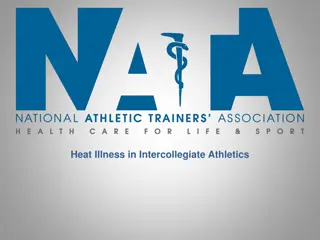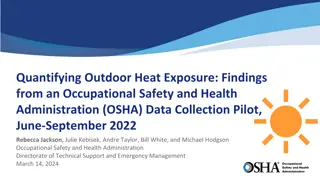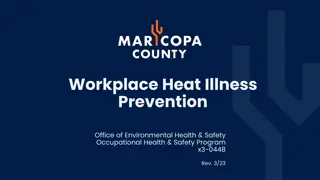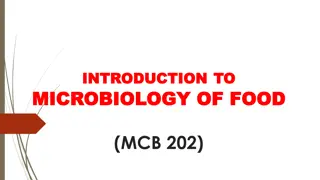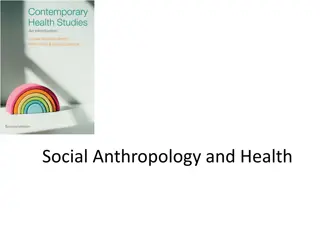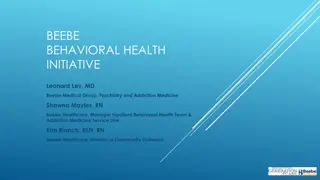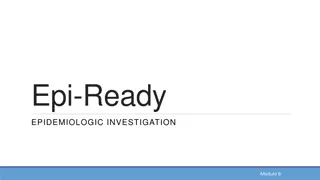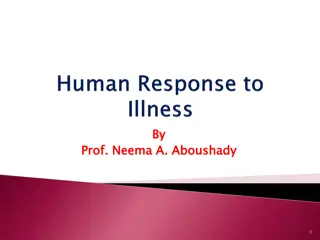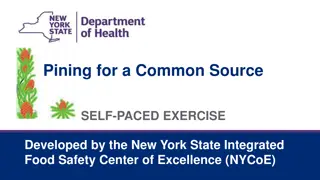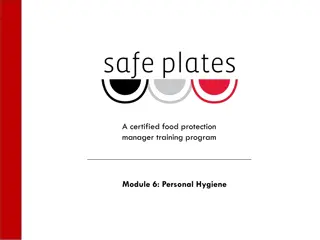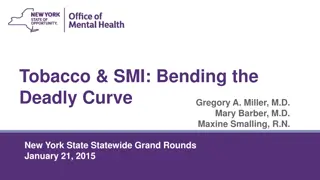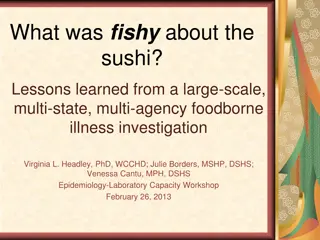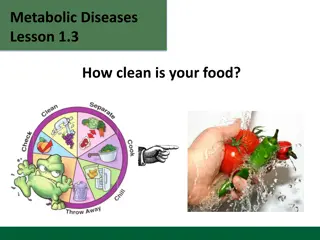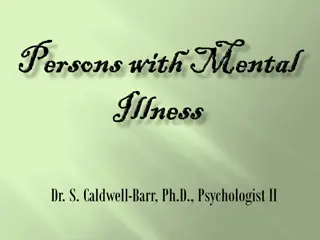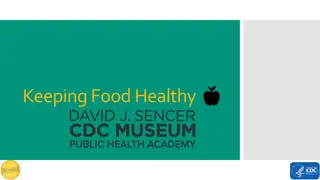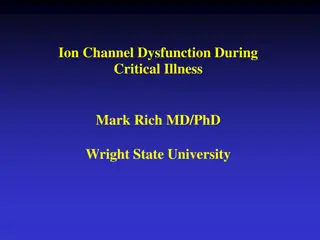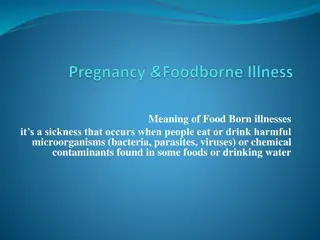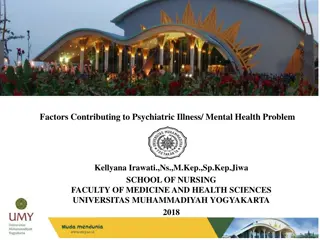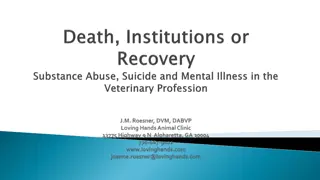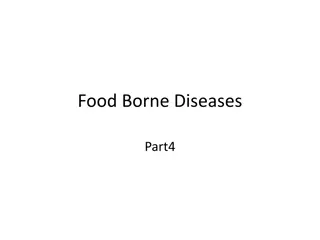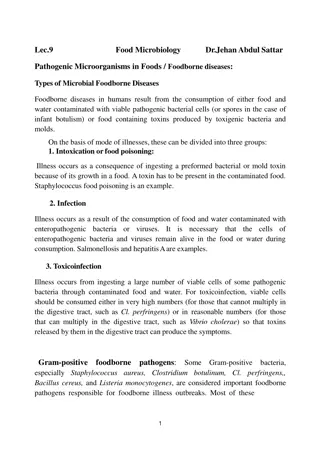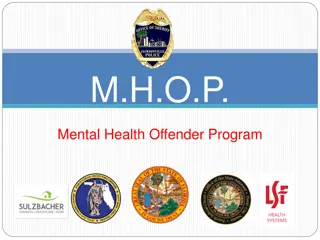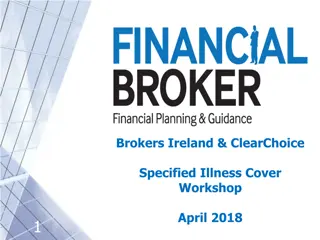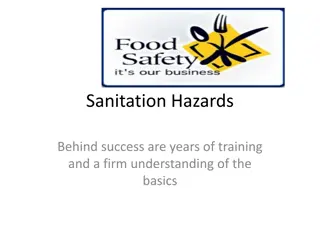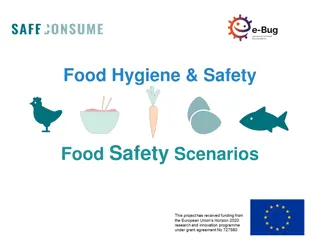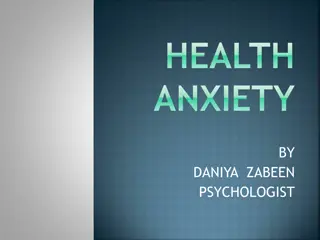Acknowledgement of Country
Acknowledging the impact of mental illness in legal settings, this content delves into identifying mental disorders, communicating effectively, and the importance of recognizing mental health issues. It highlights the prevalence of mental disorders in court-involved individuals, the criteria for men
3 views • 11 slides
The History of NAMI and the Family Movement
Founded in 1977 by two mothers seeking support for loved ones with mental illness, NAMI (National Alliance on Mental Illness) has grown to be a leading grassroots organization advocating for mental health awareness, support, and education. The Contra Costa chapter, NAMI CC, has a rich history of pro
1 views • 15 slides
Understanding Mental Health vs. Mental Illness
Explore the nuanced differences between mental health and mental illness, where mental health pertains to the quality of mental and emotional wellbeing for everyone, while mental illness refers to diagnosable conditions with long-term effects that do not affect everyone in the same way. Gain insight
9 views • 18 slides
Prevention and Treatment of Heat Illness in Intercollegiate Athletics
Learn about exertional heat illness prevention strategies, identification of predisposed athletes, and treatment approaches for heat cramps and heat exhaustion in intercollegiate athletics. Proper hydration, acclimatization, education, and monitoring are crucial for athlete safety during high heat s
1 views • 10 slides
Insights on Outdoor Heat Exposure: OSHA Data Collection Pilot 2022
The Occupational Safety and Health Administration (OSHA) conducted a Data Collection Pilot from June to September 2022 to quantify outdoor heat exposure and assess employer heat illness prevention programs. Key findings include identifying elements of successful prevention programs, comparing workpl
0 views • 22 slides
Workplace Heat Illness Prevention Program Overview
This workplace heat illness prevention program overview discusses risk factors, how the body handles heat, types of heat illness, prevention strategies including water consumption and shade, importance of acclimatization, emergency response procedures, OSHA standards, job and personal risk factors,
0 views • 28 slides
Understanding Microbiology of Food and Foodborne Diseases
This introduction delves into the world of microbiology in relation to food, exploring key terms such as foodborne diseases, food hygiene, contamination, and more. It covers crucial concepts like toxic-infection, carriers, pathogens, and vectors, shedding light on the importance of food safety pract
1 views • 32 slides
Understanding the Intersection of Social Anthropology and Health
Social anthropology investigates the cultural and social dimensions of health, providing insights into how illness and medical care are shaped by cultural contexts. This discipline explores the impact of culture on individual health, highlighting how collective beliefs influence perceptions of healt
0 views • 20 slides
Beebe Behavioral Health Initiative Overview
Beebe Behavioral Health Initiative focuses on integrating behavioral health services into primary care settings to improve access and quality of care for individuals facing mental illness and substance use disorders. The initiative includes collaborative patient-centered care, stigma reduction, and
0 views • 6 slides
Epi-Ready: Investigating Foodborne Outbreaks & Epidemiologic Approaches
In Module 6 of the Epi-Ready Epidemiologic Investigation series, participants learn about epidemiologic approaches in responding to foodborne outbreaks. The module covers methods for information gathering, measures of association, statistical significance, case definitions, surveillance activities,
1 views • 41 slides
Nursing Strategies for Emotional Reactions to Illness
In this content, the focus is on understanding the stages of illness and the crucial role of nurses at each stage. It also highlights the patient's emotional needs during illness and the importance of maintaining a positive self-image. Nursing strategies for assisting patients in coping with anxiety
0 views • 8 slides
Understanding Foodborne Illness: Causes and Symptoms
Foodborne illnesses are diseases transmitted to humans through contaminated food, causing symptoms like nausea, vomiting, stomach cramps, fever, and diarrhea. These illnesses are mainly caused by pathogenic microorganisms such as bacteria, viruses, and parasites, often spread through mishandling of
0 views • 10 slides
Managing Physical Health in Severe Mental Illness with a Focus on Diabetes
This educational material presents a comprehensive slide set designed to aid in the management of physical health in individuals with severe mental illness, focusing on diabetes. It includes insights on the challenges faced by healthcare professionals, learning objectives on diabetes management, and
0 views • 14 slides
County Fair Chocolate Scare Case Study - Colorado Integrated Food Safety Center for Excellence
Based in Denver, Colorado, this case study discusses a foodborne illness outbreak at a county fair due to unintentional marijuana-infused food consumption. The study aims to prompt discussions among health professionals on responding to such outbreaks, outlining objectives like identifying unintenti
2 views • 50 slides
Foodborne Illness Outbreak Investigation Procedures and Protocols
In this self-paced exercise developed by the New York State Integrated Food Safety Center of Excellence, learners will delve into the intricacies of investigating foodborne illness outbreaks. The course covers topics such as identifying outbreak patterns, roles in outbreak investigations, interpreti
0 views • 171 slides
Understanding Involuntary Commitment Criteria for Adults with Serious Mental Illness
Involuntary commitment for adults with serious mental illness is a sensitive issue that involves specific criteria to determine if someone poses a danger to themselves or others. The criteria include having a serious mental illness, being a threat to self or others, or having an inability to provide
0 views • 67 slides
Managing Staphylococcus Risks in Food Preparation
Learn about a foodborne illness outbreak linked to Staphylococcus aureus, caused by improper food handling practices. Understand the symptoms, likely causes, and prevention strategies to minimize the risk of toxin formation. Explore best practices and key terms related to food safety.
0 views • 27 slides
Understanding the Impact of Tobacco Use on People with Serious Mental Illness
People with serious mental illness are significantly affected by tobacco use, with smoking being a leading preventable cause of early death in this population. This presentation highlights the reasons behind smoking in individuals with mental illness, challenges faced in cessation efforts, and the i
0 views • 12 slides
Importance of Kitchen Safety and Foodborne Illness Prevention
Understanding the significance of kitchen safety and foodborne illness prevention is crucial to maintaining a safe and sanitary cooking environment. This overview delves into the risks associated with improper practices, such as wearing jewelry while cooking, consuming raw cookie dough, and the pote
0 views • 29 slides
Lessons Learned from Large-Scale Foodborne Illness Investigation
This presentation discusses a Salmonella Bareilly outbreak investigation involving sushi in 2012. It covers the roles of various agencies, surveillance methods, and key events during the investigation. The importance of early detection and collaboration in managing foodborne illnesses is highlighted
0 views • 42 slides
Food Safety and Preventing Food-borne Illness
This lesson focuses on the importance of food safety, addressing how clean our food is and at what points safety can be compromised. It delves into common types of microbes that contaminate foods and explores ways in which food safety can be compromised. The activity involves case studies on food sa
0 views • 11 slides
Understanding Mental Illness and Disability Rights
This content provides insights into commonly held attitudes and beliefs about mental illness, the American with Disabilities Act of 1990, definitions of mental illness per NRS 433A.115, and interactions with individuals with mental health issues. It also covers misconceptions, the 72-hour hold for m
0 views • 60 slides
Understanding Food Safety and Preventing Foodborne Illness
Exploring the importance of food safety, this content delves into common bacteria found in human intestines, food recalls, and outbreaks caused by E. coli and Salmonella. It highlights initiatives by CDC in monitoring, detecting, and preventing foodborne diseases, emphasizing the significance of sur
0 views • 16 slides
Understanding Ion Channel Dysfunction in Critical Illness
An intriguing case study presents a young male with weakness and coma in the ICU following pneumonia and sepsis. Nerve conduction results indicated critical illness myopathy and polyneuropathy, along with cardiac abnormalities. Reduced muscle excitability was attributed to a sodium channelopathy. Th
0 views • 14 slides
- Risks of Foodborne Illnesses During Pregnancy
- Pregnant women are at high risk of foodborne illnesses due to weakened immune systems. Such illnesses can lead to serious health issues for both mother and fetus, including miscarriage and premature delivery. Symptoms may include stomach-related discomfort, vomiting, and diarrhea. Immediate medica
0 views • 15 slides
Factors Contributing to Psychiatric Illness and Mental Health Issues
Factors contributing to psychiatric illness and mental health problems include predisposing factors such as psychological and biological factors, as well as precipitating stressors like challenging stimuli. Mental health is defined as a state of well-being involving happiness, contentment, and effec
0 views • 15 slides
Understanding the Microworld: Factors Affecting Foodborne Pathogens
This chapter delves into the microworld of microorganisms and pathogens that can contaminate food, leading to foodborne illnesses. It covers key terms such as bacteria, viruses, parasites, and fungi, along with topics on preventing contamination, understanding spores, and the temperature danger zone
0 views • 25 slides
Understanding Legal Ramifications of Mental Illness in Criminal Justice System
Mental illness presents complex challenges in the criminal justice system, impacting court rulings, constitutional issues, and perceptions of vulnerability. Cases like James Holmes and John Hinckley highlight the intersection of mental health and criminal behavior. Legal standards regarding executio
0 views • 9 slides
Understanding the Intersection of Addiction and Mental Illness in Veterinarians
Explore the profound impact of addiction and mental illness on veterinarians, highlighting the biological and environmental components, the prevalence of serious mental illness, the challenges in seeking mental health help, and the heightened risk of suicide within the veterinary profession. Promote
0 views • 28 slides
Understanding Clostridium Perfringens Intoxication: Causes and Characteristics
Clostridium perfringens intoxication is a foodborne illness caused by the ingestion of food contaminated with enterotoxigenic strains of C. perfringens, leading to the production of Clostridium perfringens enterotoxin (CPE). This article discusses the characteristics of CPE, the origins of the organ
2 views • 23 slides
Understanding Food Safety: Essential Knowledge and Practices
Exploring the fundamentals of keeping food safe, this content covers topics such as foodborne illnesses, contaminants, food safety responsibilities, key terms like time-temperature abuse and cross-contamination, and high-risk populations. Discover how to identify foodborne illnesses and recognize fa
0 views • 22 slides
Understanding Foodborne Diseases and Pathogenic Microorganisms in Foods
Foodborne diseases in humans are caused by consuming contaminated food or water containing pathogenic microorganisms or toxins. These diseases can be categorized into intoxication, infection, and toxicoinfection, each with distinct modes of illness. Pathogens like Staphylococcus aureus, Clostridium
0 views • 5 slides
Mental Health Offender Program: Addressing Mental Illness in the Criminal Justice System
A pilot program, M.H.O.P., aims to reduce the burden on the criminal justice system by providing pretrial release, personalized care plans, and court supervision for defendants with mental illness. By addressing the needs of the mentally ill, the program strives to break the cycle of criminal behavi
0 views • 21 slides
Enhancing Advising Process for Specified Illness Cover Workshops
Guidance on developing a structured process for advising on Specified Illness Cover, addressing challenges faced by financial brokers in selling and positioning the product. Workshop objectives include client engagement, research, explaining benefits, and product understanding. The content covers ag
0 views • 53 slides
Importance of Sanitation in Food Handling
Behind culinary success lies years of training and a solid grasp of food safety basics. Unsafe food handling can lead to foodborne illnesses, outbreaks, and even legal consequences. Sanitation practices are crucial to prevent contamination and ensure food safety in professional kitchens, reducing th
0 views • 8 slides
Food Hygiene & Safety Scenarios: Learning the Importance of Proper Food Handling
Explore three scenarios highlighting the significance of food hygiene and safety. From understanding the consequences of foodborne illnesses to recognizing the importance of following proper food handling practices, these scenarios shed light on critical aspects of food safety. Learn how simple acti
0 views • 7 slides
Investigating Foodborne Illness Outbreaks Linked to Events
An organization is investigating outbreaks of foodborne illnesses associated with two different events: a wedding in Pueblo and the National Western Stock Show. The wedding outbreak involves confirmed cases of Norovirus, affecting several guests, while the stock show outbreak is linked to E. coli O1
0 views • 16 slides
Understanding Health Anxiety: Causes, Symptoms, and Impacts
Health anxiety, also known as illness anxiety or hypochondria, is characterized by obsessive worry about having a serious medical condition. Individuals with health anxiety misinterpret minor body sensations as symptoms of a severe illness, despite reassurance from medical professionals. This condit
0 views • 16 slides
Food Safety Facts - Higher or Lower Quiz
Discover interesting food safety facts through a "Higher or Lower" quiz game where you learn about hygiene ratings, food allergens, safe cooking temperatures, storage guidelines, and foodborne illness statistics related to lettuce. Test your knowledge and boost your awareness of essential food safet
0 views • 6 slides
Understanding Food Safety: Microorganisms, Illnesses, and Prevention
Explore the world of food safety through the lens of microorganisms, illnesses, and prevention methods. Learn about different types of bacteria that can cause foodborne illnesses, such as Clostridium Perfringens and Staphylococcus Aureus, and understand the distinction between food intoxication and
0 views • 12 slides



